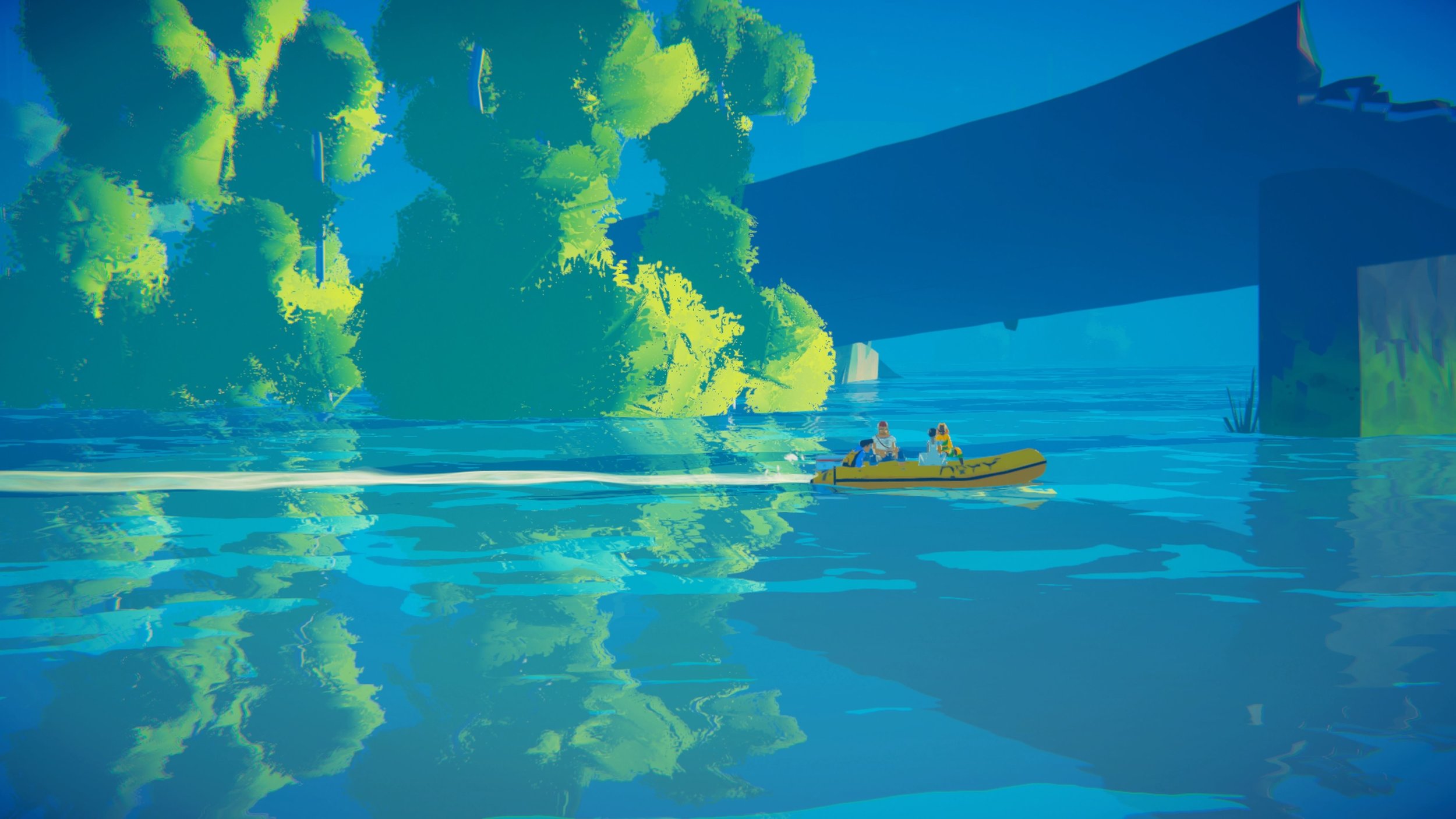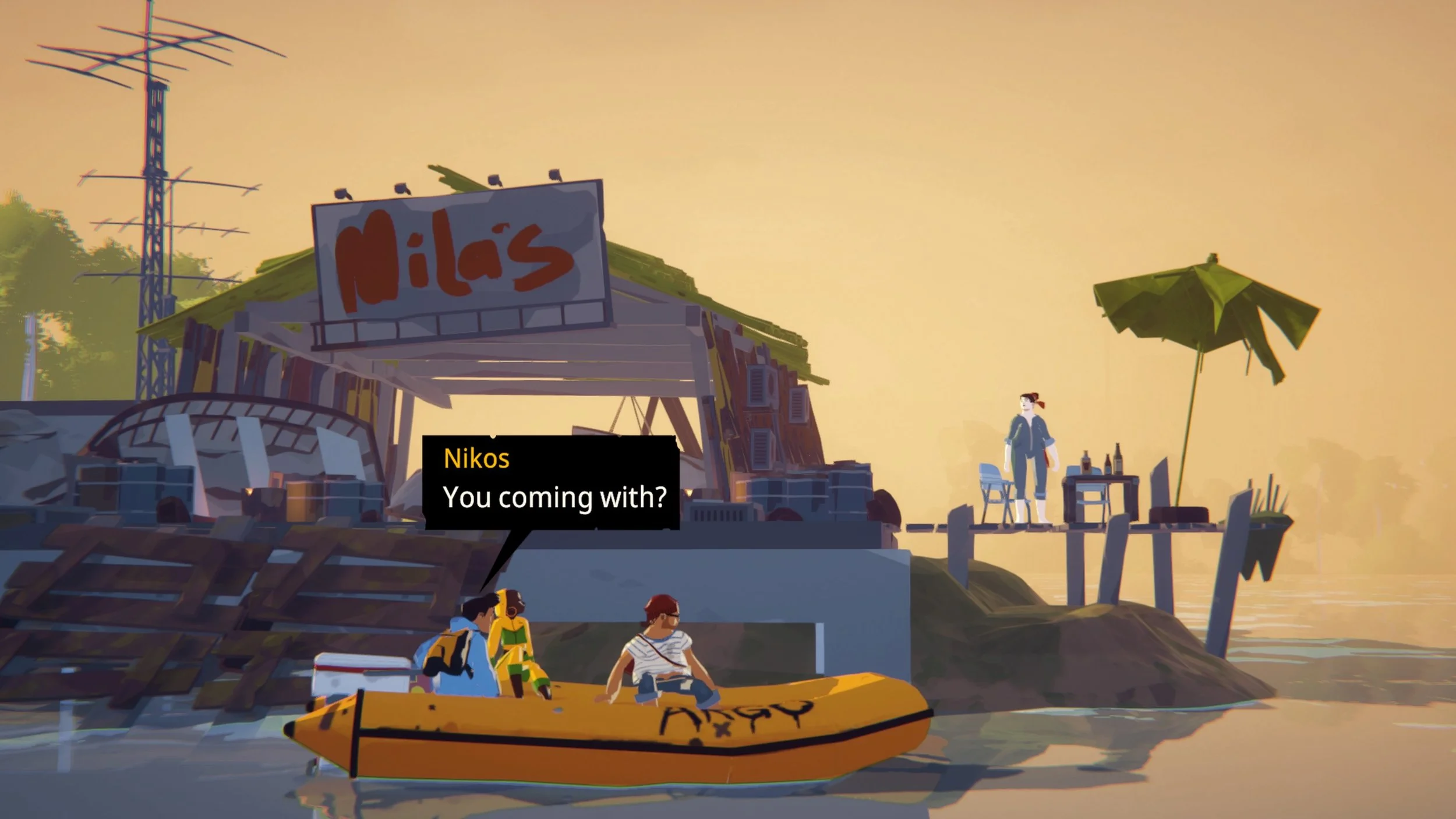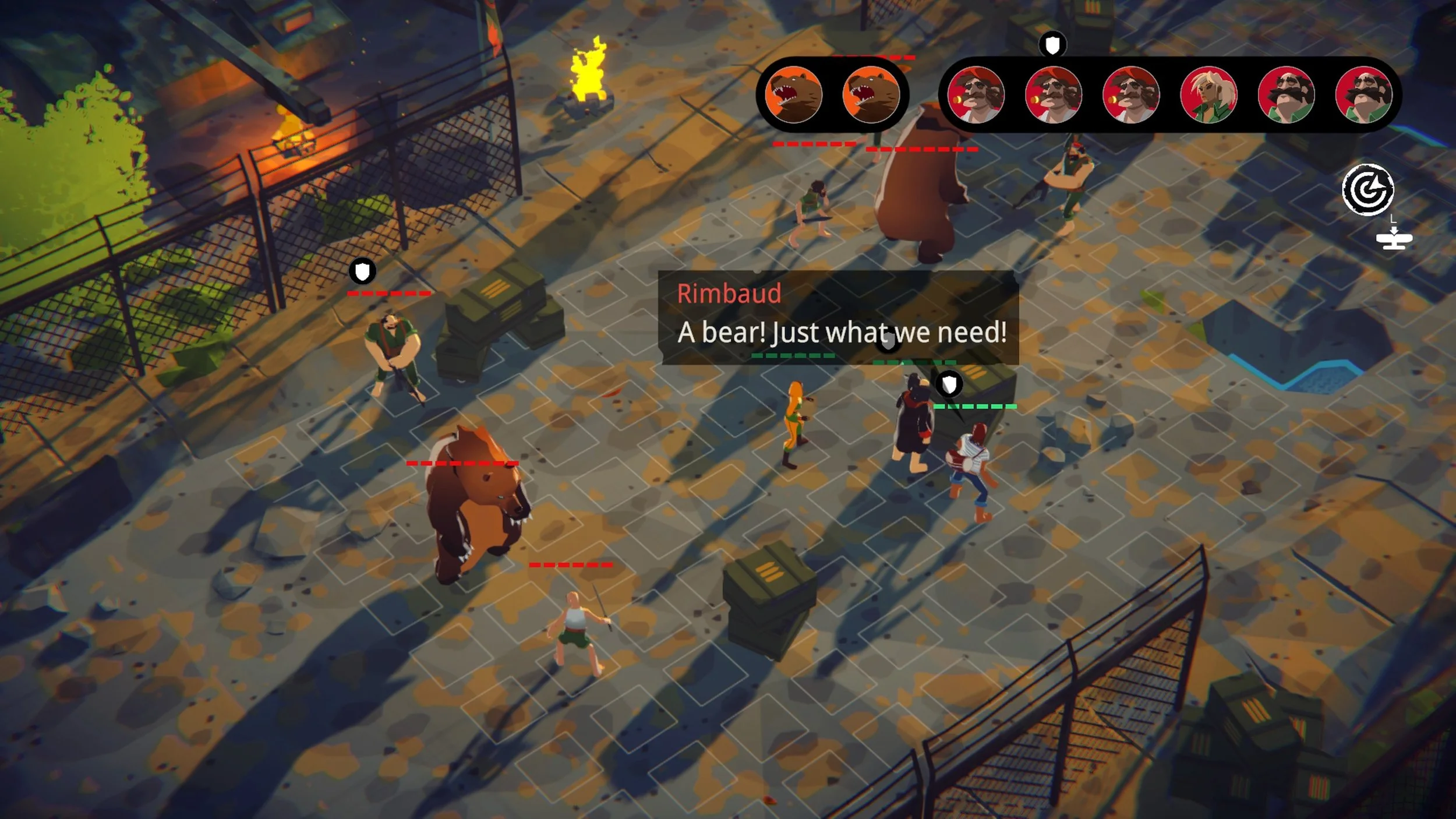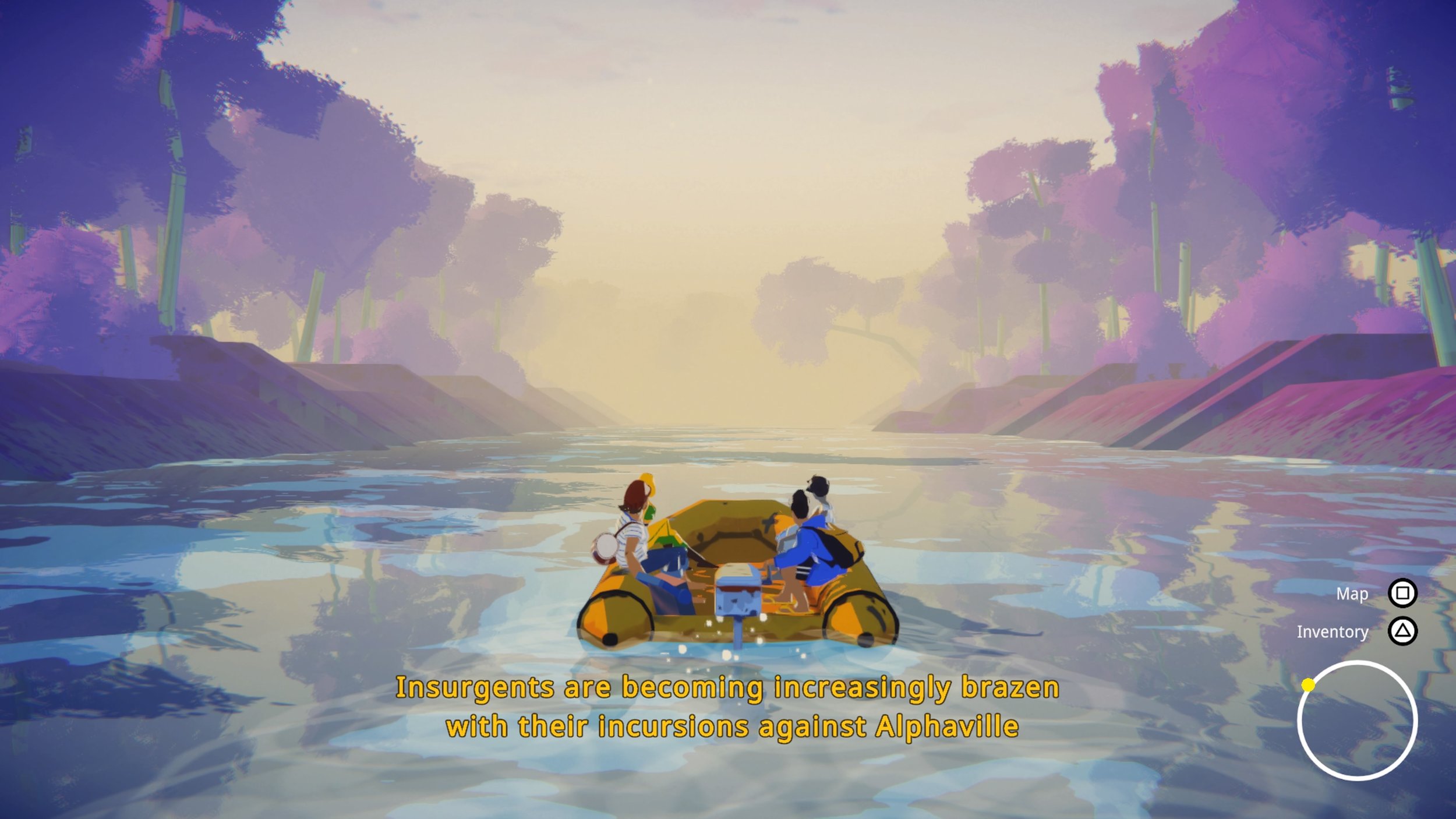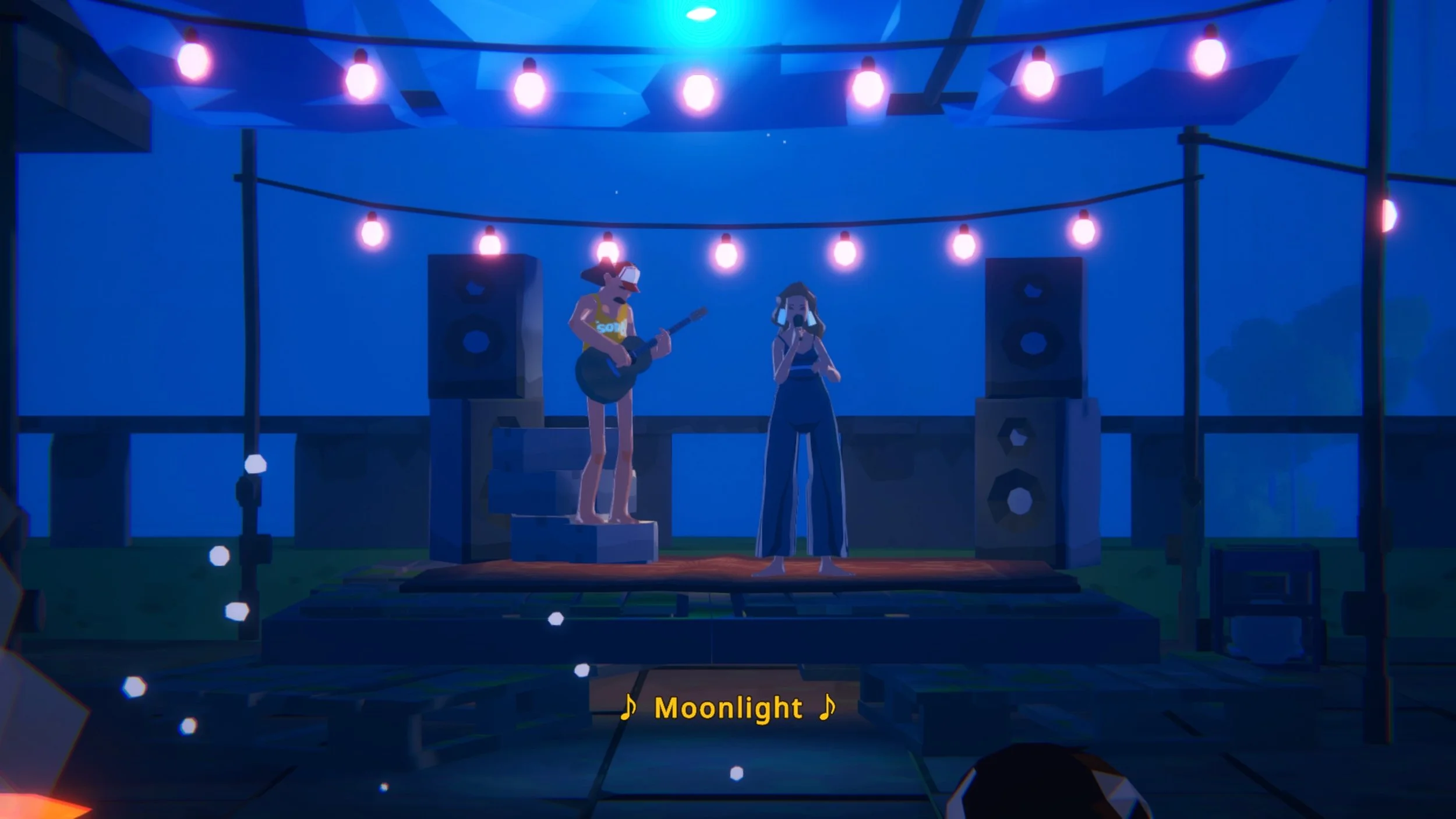Highwater's Surrealist Farce and Lost Children
Tof Eklund, Contributing Editor
When I started playing Highwater, I wondered if Demagog Studio's sophomore release wasn't sure what it wanted to be. The peaceful beauty and melancholy of navigating a flooded metropolis being reclaimed by nature, the skewering of present-day politics and punditry, the dire situation of a have-not population on the brink of starvation, and the fights where desperate struggle was undercut by slapstick comedy didn't seem to cohere.
A little later, it all clicked. Highwater isn't an eco-drama or a political satire; it's a surrealist farce that sweetens it's dark themes with a heaping spoonful of what-the-fuckery in the vein of 90's surrealist films like Delicatessen (1991), The City of Lost Children (1995), and Dark City (1998).
Characters on their boat cruise by an island and ask a friend, “You coming with?”
The game opens with title cards explaining that the world has been wrecked by climate change and war over what remains, but that the flooded region around the rich enclave of Alphaville had been peaceful. Things changed when Alphaville suspended its food aid programme. Now people are getting desperate, violence is increasing, and rumor has it the wealthy Alphavillians are preparing to evacuate to Mars.
From this dire setup, we zoom in on the game's protagonist, a young man named Nikos, asleep on a small yellow inflatable boat with an outboard motor. The name "Argo" has been messily stenciled on the boat's side. We soon discover that Nikos has a plan - not to save the world, this isn't an American disaster movie - but to get on that rocket to Mars. If Highwater was the grimly realistic story that I was expecting, that might seem tragic or callous: he has to leave behind the impromptu orphanage he'd been scrounging food for, leaving those children to die.
But Highwater's plot isn't realistic: Nana, the punk-rock grandma running the orphanage, says the kids are healthy, adapting to the new world, and we're supposed to believe her. This transforms what should be a hopeless situation into a coming-of-age story. Highwater is about Nikos' search for a better life, an escape from a world that doesn't make sense.
And hoo boy, does this world not make sense. In this game, you'll steal a sheep to be a wedding dinner, play basketball with a gaggle of happy orphans, stop to appreciate a punk rock concert performed from an island barely large enough to hold the band, and confront foes as varied as train enthusiasts, dollar-store Vikings, and actual-factual bears.
A fight with some bears thrown in the mix. One character, Rimbaud, says, “A bear! Just what we need!”
This is an apocalypse at least as strange and funny as that of Jean-Pierre Jeunet and Marc Caro's Delicatessen, a movie set in a world where the sky is always dark and food is becoming increasingly scarce. The film's protagonist, Louison - a clown-turned-handyman, must avoid being butchered and served as lunchmeat in his landlord's deli. Delicatessen is a movie that dares you not to laugh when a man named Tapioca turns over his mother-in-law in lieu of rent, and that's the kind of game Highwater is.
Early in the game, Nikos rescues a drunk and depressed Alphavillian named Mark, but this isn't a plot hook. It's the setup for a gag. When Niko's friend George sees Mark sleeping it off in the Argo he says, "There's no room for an Alphavillian on this raft," then picks Mark up and tosses him overboard. It's funny and life is cheap, see? This happens just after Niko travels to an island named "Delicatessen" to steal a cannibalistic butcher's pet sheep Daisy. Daisy becomes the centerpiece of a wedding dinner, and we later learn that the happy couple got too drunk and, like Mark, drowned. Like I said, life is cheap.
Alphaville itself is a reference to Jean-Luc Goddard's 1965 film of the same title. Alphaville is seriously weird noir sci-fi: Lemmy Caution, a hard-boiled gumshoe, infiltrates a soulless futuristic city on a mission to assassinate the computer (Alpha 60) that runs it. It's a story about the power of poetry and fisticuffs to resist technocratic perfectionism.
Well, today's technocrats aren't so much emotionless machines as entitled jerks who spend fortunes stroking their own egos, and they're the ones who put the "villain" in Alphavillian. They're the ones responsible for this Alphaville's all-too-familiar AI, along with an entire zoo in tiny but accessible cages, and other bad ideas made real through excess spending power. Goddard projected his fears about the future onto the monolithic, cleanly-cut and sharp-cornered Modernist architecture then starting to pop up around Paris. In Highwater, most of what would have been associated with Modernism has drowned and been reclaimed by nature, so Demagog's fear of the future takes the form of tacky nostalgia: Alphaville is Tomorrowland, as reimagined by the minds that brought you Dogecoin and Bored Ape Yacht Club.
The crew motors down a flooded channel, with pink-stained trees looming over the edges. The radio host says, “Insurgents are becoming increasingly brazen with their incursions against Alphaville.”
Even as Highwater name-checks Alphaville, it feels more like the mid-point between Alex Proyas' Dark City and Jeunet and Caro's The City of Lost Children. Dark City is basically a remake of Alphaville, just with an amnesiac gumshoe (John Murdock) and psychic aliens instead of an evil computer. Victory in Alphaville looks like a CIA-backed coup, with death, destruction and panicked people running in every direction, but when Murdock finally faces and overcomes Mr. Book (commander of the psychic aliens), his only reward is discovering that Shell beach, the paradise that's been haunting his fragmented memories, never existed. Like its protagonist, Dark City is nostalgic for a world that is long since gone… if indeed it ever existed.
Demagog's previous game, Golf Club Nostalgia (originally Golf Club Wasteland) feels a lot like Dark City: it clears the sand pit of historical and cultural amnesia only to land with a plunk in a lake of hopeless nostalgia. Set in the same world as Highwater, but some time after, it's a side-scrolling golf game, played on a desolate Earth by an Alphavillian, back from Mars to golf the ruins in his bright yellow space suit. It's a chill game with chill music, the in-world Radio Nostalgia from Mars, and it's unsettling as hell, not least because something is stalking the Alphavillian golfer.
That stalker is almost certainly "the Cub" from Demagog's recently released game The Cub, a game about a kid thriving in the ruins, listening to Radio Nostalgia on a scavenged "fishbowl" space helmet and evading Alphavillian soldiers from Mars who can't breathe Earth's air anymore… or something like that. I think the Cub is one of the orphan kids from Highwater. Minimally, he's the fulfillment of Nana's prophecy that the kids are adapting to the changes that destroyed "civilisation," thriving in a world healing itself now that the grumps are gone.
The Cub's situation is parallel to that of the orphans in The City of Lost Children. Their problem isn't a lack of supervision, it's that they're being kidnapped so a predatory adult, Krunk, can literally steal their dreams. Krunk is aging rapidly, and feeds on the dreams of children to rejuvenate himself. He's just like the Highwater's Alphavillians who, not content with having consumed and extracted their civilization to death, now want to escape the consequences of their greed.
The closest thing to a good adult in The City of Lost Children is One (yes, he's named One), a childlike strongman whose brother has been kidnapped. One helps Miette, the film's protagonist, save the orphans. Miette is herself an orphan, perhaps ten years old, and she triumphs through a combination of cleverness and profound coincidence: when all seems lost, she sheds a single tear… and that tear, flung through the air, sets of a chain of increasingly unlikely events that ultimately turn the tables in her favor.
By the end of The City of Lost Children, all the "real" grumps are dead and it doesn't matter how the children will survive: now that they're free of the predatory older generation, the rest will be cake. That's the implicit truth for Highwater's orphans as well: the kids really are alright, they just need the rest of us to bugger off.
A singer and guitarist perform on an outdoor stage after dark. A subtitle reads, “♪ Moonlight ♪”
The Cub is a game about getting the grown-ups to bugger off, but as much as Highwater incorporates that plot, this game is ultimately about Nikos, who is old to stay with the kids and too jaded to inherit the Earth once the grumps are gone, but still young enough to want and deserve a better future. So he, and a few of his young-adult friends, are going to stow away on a rocket to Mars while grooving to Highwater Pirate Radio (Radio Nostalgia's forerunner).
So yes, in Highwater, most of the Earth's population is dead or dying, but we deserve it. The punk-rock grandmas among us accept this because they know the kids are alright. The rising generation will thrive in our wreckage, while today's young adults go off on an adventure to subvert the plans of the über-wealthy.
When Highwater has you using a fishing rod to pull spandex-clad Vikings into a convenient pool of water that has a Command & Conquer: Red Alert-style Tesla coil in the middle of it, you needn't wonder why. In this surreal and senseless world, like those of Jeunet and Caro, bizarre coincidence favors the young and spunky. Highwater won't be everyone's cup of tea: it's more like boba tea served piping hot with Legos and a dram of scotch. But if you can get on its wavelength, it's quite a trip.
Rogue provided a review code for this game. As usual for GwG, PR played no part in the resulting writing or publication of this review.
